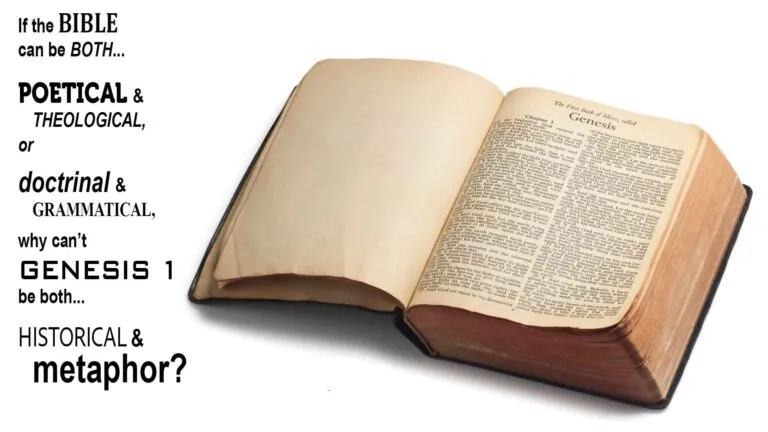or Doctrinal?
or Theological?
or Covenantal?
or an Accommodation?
or so on and so on and so on
*****
We know you can’t have your cake and eat it too. We know a man cannot serve two masters. And we know Genesis 1 cannot be both history and mere metaphor. That’s all true.
But can Genesis 1 be history and much, much more?
Not an either/or
Among Christians one of the more common ways of undermining the historical reliability of the opening chapters of the Bible is to highlight some other attribute of this passage. We’re told that the point here isn’t to tell us how things were created but rather Who is responsible. This is a theological treatise, not a scientific one, right? And it can’t be history because in some ways it resembles poetry.
In his book God’s Pattern for Creation: A Covenantal Reading of Genesis 1 United Reformed pastor Dr. W. Robert Godfrey gives several examples of this same dismissive approach. The President of Westminster Seminary in Escondido, California contrasts a covenantal understanding of Genesis 1 with understanding it as history. He says a choice has to be made since the days of creation as described in Genesis 1 “are not a timetable of God’s actions but are a model timetable for us to follow.” While “the days and week of Genesis 1 are presented to us as a real week of twenty four hour days,” “these days and week… do not describe God’s actions in themselves but present God’s creative purpose in a way that is a model for us.”
He pitches this same contrast, between a historical and covenantal understanding again and again.
“Genesis is not a world history text… it is a covenant history focusing on what the people of God need to know about their God and about themselves”
“Genesis is not written as a history book for uninformed, worldwide readers, but is part of the covenant history written for a covenant people who already know their God”
“The revelation of God as the all-powerful creator is not just information for the world. It is a message to the covenant people about the character of their God.”
“Genesis 1 is not an encyclopedia of history or science but a covenant revelation of the character of the creation that God made for man…”
Clearly, given the repeated “not this… but that” rhetorical device used by Godfrey, his assertion that Genesis 1 is “covenantal” in character is meant to counter an opposing view of the creation account. To Reformed Christians, this kind of “covenantal language” has its appeal; we love the covenant, and we love covenant theology, because we see in the covenants of Scripture the structure and beauty of God’s relationship with His people, and indeed with all of creation. But I question Godfrey’s assertions in all of these statements, because they create a conflict where one does not necessarily exist!
This “not this… but that” language creates the impression that the two parts of the statement are mutually exclusive. If Genesis 1 is “covenantal” in its character, does that necessarily mean that it is not a history of the world? Of course, Godfrey does use the phrases “world history text” and “encyclopedia of history or science,” appearing to assert that those who argue for the “six consecutive real days that actually happened in history” view actually consider the opening chapters of the Bible to be a scientific treatise of some sort. This kind of language is not at all helpful, and it mischaracterizes those who believe that God created all things in the span of six actual historical days.
Both/and
Here’s an example of this kind of thinking in practice. Suppose for a moment that two men come across a field of barley for the very first time. One man looks at the barley and says, “Clearly this crop is meant only to form the basis for a beverage. I will harvest it, mash it, ferment it, and make beer.”
The other man looks at the barley and says, “Clearly this crop is meant only to form the basis for bread. I will harvest it, grind it, and use the end product to make bread.”
Both men refuse to acknowledge the truth of the other’s discovery. So, the one man makes nothing but beer, and the other man makes nothing but bread. Both die, one from cirrhosis of the liver, the other from dehydration. Why do they die? Because they both failed to realize that they were not dealing with an “either-or” equation, but a “both-and.” Barley has multiple uses; therefore, one use does not exclude the other. In creating a false dichotomy between two applications of the text, Godfrey misses out on a very important aspect of the message of the six days of creation.
A true either/or
Now I should note that while Godfrey does not accept Genesis 1 as a real chronology of events, he still insists his view is a literal interpretation and “also historical in its approach as it affirms that God created in time and by his sovereign power everything described in Genesis 1.” Given the fact that, according to Godfrey, “we must conclude that the days of creation in Genesis 1 are not simple chronology” I find it difficult to harmonize Godfrey’s actual view with his claims. In contrast to the false dilemma that Godfrey presents, between understanding Genesis 1 as true history or as covenantal, there does seem need for a choice to be made here. He can’t offer up his view as literal and historical and still dispute that creation occurred in six actual days.
Conclusion
So yes, we can’t have our cake and eat it too. But no such choice has to be made between understanding Genesis as historical and covenantal, between it being historical and theological. These are simply false dilemmas.
Rev. Witteveen’s website is Dan1132.com. This first appeared in the June 2015 issue.











